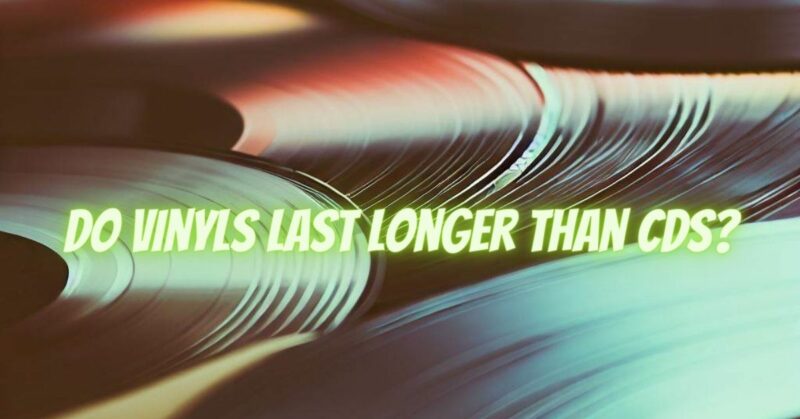When it comes to the longevity of music formats, vinyl records and CDs have both stood the test of time. In this article, we explore the factors that contribute to the durability of vinyl records and CDs, and discuss whether vinyls truly last longer than CDs.
- Physical Wear and Tear:
Vinyl records are susceptible to physical wear and tear due to their analog nature. With each play, the stylus physically contacts the grooves, resulting in gradual wear on the record’s surface. Additionally, mishandling, improper storage, and exposure to dust and contaminants can further contribute to degradation over time. In contrast, CDs are less prone to physical damage since they rely on lasers to read the digital information encoded on their surface.
- Disc Rot:
One of the notable issues that can affect CDs is “disc rot,” a term used to describe the deterioration of the CD’s reflective layer or protective coating. This can occur due to manufacturing defects, exposure to high temperatures or humidity, or poor-quality materials. Disc rot can lead to the loss of data and ultimately render the CD unplayable. Vinyl records, however, do not suffer from disc rot since they do not rely on reflective layers or protective coatings.
- Lifespan and Handling:
Under ideal conditions and proper care, both vinyl records and CDs can have a long lifespan. Vinyl records, with their sturdy construction, can withstand many plays if handled and stored correctly. CDs, on the other hand, are more susceptible to scratches, smudges, and damage from improper handling. However, with careful handling and appropriate storage, CDs can also last for decades without significant degradation.
- Environmental Factors:
Environmental conditions play a crucial role in the longevity of both vinyl records and CDs. Vinyl records are sensitive to extreme temperatures and high humidity, which can cause warping, mold growth, or damage to the sleeve and cover. CDs are less affected by temperature and humidity variations but can still be damaged by exposure to excessive heat or direct sunlight. Therefore, maintaining suitable storage conditions is essential for the longevity of both formats.
- Digital Decay and Technological Obsolescence:
While vinyl records and CDs are physical formats, it is worth considering the potential impact of digital decay and technological obsolescence on long-term accessibility. CDs, being digital storage media, may face challenges in the future if CD players become less common or if the digital data becomes obsolete. Vinyl records, although analog, require compatible turntables for playback. However, the analog nature of vinyl allows for potential reissues and continued playback on various turntable models.
Conclusion:
Determining whether vinyl records last longer than CDs involves various factors and considerations. While vinyl records are prone to physical wear and tear, they do not suffer from disc rot like CDs. Both formats can have long lifespans with proper care and handling. Environmental conditions, such as temperature and humidity, should be monitored to ensure the longevity of both formats. Additionally, the potential impact of digital decay and technological obsolescence should be considered for CDs. Ultimately, the durability of vinyl records and CDs depends on how well they are maintained and the future accessibility of playback equipment for each format.


